
Mohammed Momoh
The total value of capital importation into Nigeria stood at $1,294.94 million in the second quarter of 2020, just as the country is reported to have saved $2 billion on Engineering Procurement and Construction (EPC) contract for gas project.
The National Bureau of Statistics (NBS) reported in its Nigerian Capital Importation second quarter of 2020 (Q2 2020) which it said represented a decrease of -77.88 per cent compared to the first quarter of 2020 and -78.60 per cent in the second quarter of 2019.
The largest amount of capital importation by type was received through Other Investment, which accounted for 58.77 per cent ($761.03 million) of total capital imported.
This was followed by Portfolio Investment, which accounted for 29.76 per cent ($385.32 million).
Also, Foreign Direct Investment (FDI) accounted for 11.47 per cent ($148.59 million) of total capital imported in the second quarter of 2020.
By sector, capital importation by shares dominated in the second quarter of 2020 reaching $464.57 million of the total capital importation.
The United Kingdom emerged as the top source of capital investment to Nigeria with $428.83 million.
The investment accounted for 33.12 per cent of the total capital inflow in the second quarter of 2020.
By Destination of Investment, Lagos state emerged as the top destination of capital investment in Nigeria with $1,130.49 million.
This accounted for 87.30 per cent of the total capital inflow in the second quarter of 2020.
By bank, Standard Chartered Bank Nigeria Limited emerged at the top of capital investment in Nigeria with $425.21 million.
This also accounted for 32.84 per cent of the total capital inflow in the second quarter of 2020.
Also, the country’s strides in the promotion of local content has started yielding results, especially as it affects the contract for Nigeria Liquefied Natural Gas (LNG) Train 7 Project through the Nigerian Oil and Gas Industry Content Development (NOGICD) Act implementation.
Mr Simbi Wabote, Executive Secretary, Nigeria Content Development and Monitoring Board (NCDMB), said on Augusts 29, 2020 said that ample evidence had proven that sustainable Local Content practice reduced the cost of oil and gas projects in addition to creating job opportunities and economic prosperity.
He gave example with the LNG Train 7 EPC bid, where Saipem Contracting Nigeria and its consortium, won the contract with lower bid, leveraging on 50 years commitment to local content and investments in Nigeria.
”In the concluded LNG Train 7 project contract awarded, the difference in price between Saipem that had established itself in Nigeria and the second lowest bidder coming from outside the country was $2 billion.
“That’s a huge sum of money that this country would have lost if not for the drive for the development of local content.
“The other consortium had no footprint in the country and it proposed to put extra $2 billion on the back of the project to develop local capacity to execute the project.
“This is evidence of cost savings associated with the development of local content, ” he said.













